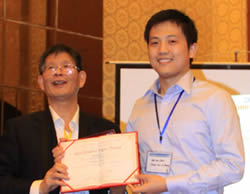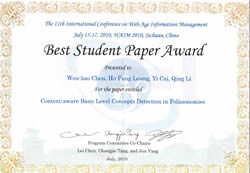Mr Wenhao Chen, a MPhil student of the Department supervised by Professor Ho-fung Leung, received the Best Student Paper Award in the 11th International Conference on Web-Age Information Management (WAIM 2010) for his paper entitled “Context-aware Basic Level Concepts Detection in Folksonomies.” WAIM is a leading international conference in Web data management. The conference received 205 submissions this year from 16 countries and regions, and only 58 full papers (28%) and 11 short papers were selected for publication. The only best student paper award that the paper by Chen et al. receives was announced and presented at the award ceremony during the conference banquet.
The paper was awarded for its contributions to the problem of exploring implicit semantics in folksonomies. In folksonomies, users create and manage tags to annotate web resources. The collection of user-created tags in folksonomies is a potential semantics source. Much research has been done to extract concepts, and even concepts hierarchy (ontology), which is the important component for knowledge representation (e.g. in semantic web and agent communication), from folksonomies. However, there has been no metric for discovering human acceptable and agreeable concepts, and thus many concepts extracted from folksonomies by existing approaches are not natural for human use. In cognitive psychology, there is a family of concepts named basic level concepts which are frequently used by people in daily life, and most human knowledge is organized by basic level concepts. Thus, extracting basic level concepts from folksonomies is more meaningful for categorizing and organizing web resources than extracting concepts in other granularity. In addition, context plays an important role in basic level concepts detection, as the basic level concepts in the same domain become different in different contexts. In this paper, a method is proposed to detect basic level concepts in different contexts from folksonomies. The existence of context effect and the effectiveness of the proposed method is demonstrated using Open Directory Project (ODP) as the benchmark.

